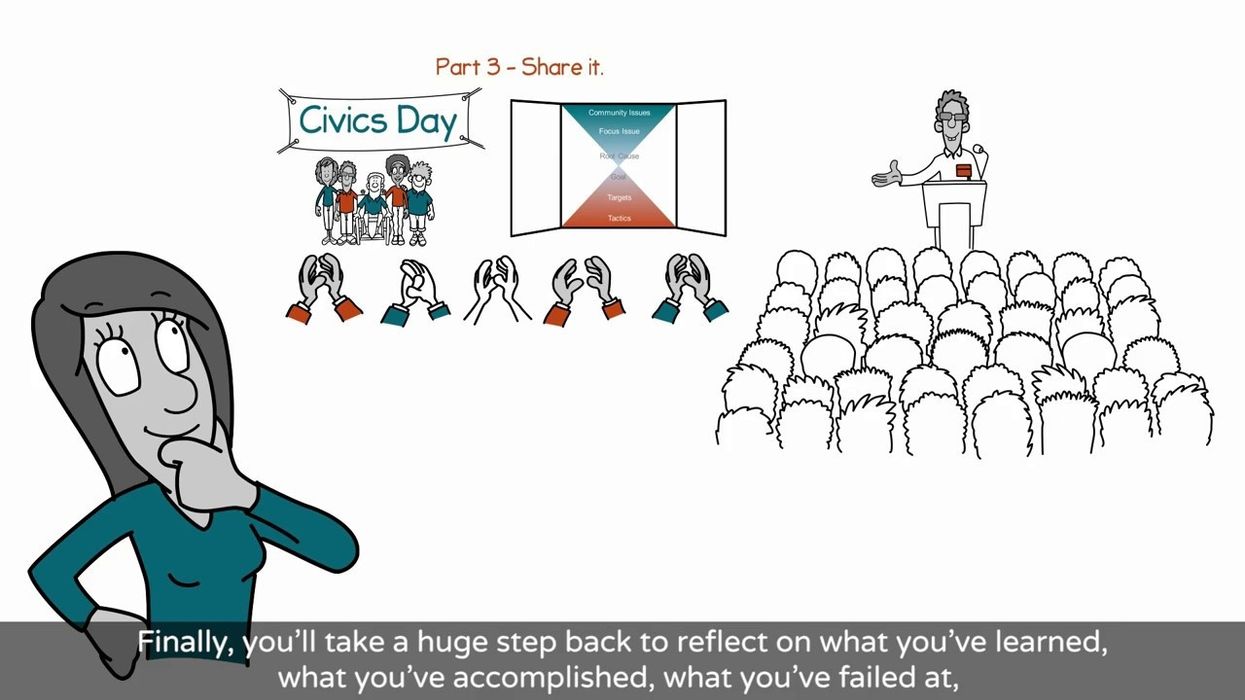Carney is a contributing writer.
Student activism is on the rise, and young voters are both expanding as a bloc and mobilizing to demand action from the politicians of 2020.
But will all voices be heard, including those of marginalized and lower-income students? And will all the buzz translate into any lasting policy or political outcomes?
Such questions preoccupy not just political organizers but civic educators, who are increasingly looking for ways to make civic learning relevant to this diverse and fired-up younger generation. Research shows gaps in both civic knowledge and civic engagement between black and Hispanic students and their white peers, as well as between students from lower- and higher-income families. And as a whole, civic learning is often perceived as dominated by white perspectives and educators.
To many leaders in the field, the antidote is "action civics," which typically invites students to identify a problem in their community, come up with a solution and take direct action to fix it. Leading groups that practice and promote action civics, including Generation Citizen and Mikva Challenge, have been expanding their reach, and grant-makers and other civic educators are taking notice.
The national civic education group iCivics has launched two student-centered initiatives, the Equity in Civics Youth Fellowship and the Youth as Civic Experts network, to give diverse students a platform and a voice in what their civic education looks like. The projects involve a collaboration between iCivics and Generation Citizen, and their work has been underwritten by a six-figure grant from the Hewlett Foundation.
"This is our first foray into this whole sphere of youth activism, elevating youth voice directly," says Amber Coleman-Mortley, director of social engagement at iCivics. "Students have a lot of great ideas. They have a lot of awareness, especially underrepresented youth that are in civic deserts."
Educators at a CivXNow coalition convening last year realized that "we're missing people of color, we're missing rural communities, we're missing student voices," Coleman-Mortley says. Both the in-person youth fellowship and the online youth network set out to remedy that by inviting students to weigh in.
Another Hewlett-funded grant in Oklahoma City will test the action civics model on an entire school district, again with diversity in mind. The $1 million initiative brings together Generation Citizen, the Oklahoma City Public Schools and Tufts University's Center for Information & Research on Civic Learning and Engagement. The idea is to train teachers throughout the district to incorporate action civics into a range of courses, including social studies and history.
"If we can be successful in integrating these practices and these ideas in a school system within a state that is really struggling with public education, then that is something that we can apply in other places," says Rey Junco, director of research at CIRCLE. "And by doing it this way, we learn things about young people who are not typically represented in the civic space that we can then fold back into educational initiatives."
The push toward action civics coincides with an upsurge in youth activism, not just in the United States but also worldwide. Young people have always been on the vanguard of public protests, of course, but climate change, gun violence, and threats to immigrant and LGBTQ rights have all helped drive students to the streets.
The number of people ages 18-24 who had attended a march or demonstration tripled between 2016 and 2018, according to CIRCLE, and that was even before Swedish teenager Greta Thunberg launched a worldwide "Fridays for Future" movement that drew millions of students to school climate strikes last year.
This year, a U.S. Climate Strike Coalition is mobilizing students to turn out voters, target primaries, and press for a Green New Deal — a comprehensive legislative package of public works projects and economic reforms to combat climate change. Young voters may also play an outsized role in the Democratic presidential primaries. A recent analysis by CIRCLE credited voters 29 and younger with propelling Sen. Bernie Sanders to victory in the New Hampshire primary.
Like their adult counterparts, the young people agitating for change are not immune from accusations that voices of color are being left out or silenced. When students at Marjorie Stoneman Douglas High School in Parkland, Fla., sparked a nationwide movement of school walkouts over gun violence, some credited the state's comprehensive civics education mandates. But others bemoaned the news media's failure to report on the black youth resistance movements that had preceded Parkland.
Not everyone agrees that action civics is the best way to help students understand politics and government. Action civics has the potential to stir political controversy, to further entrench students "in their preexisting perspectives," and to leave them "cynical and disillusioned" if their activism fails to incite change, a rgued education writer Natalie Wexler recently in Forbes.
Generation Citizen CEO Scott Warren, who will leave his post in June and recently issued a parting memo that calls on the field to diversify, counters that education should be relevant to students' lives, whatever the topic.
"One thing that we can all agree upon is that our democracy needs to be in a better place," says Warren. "We want to ensure that more people are participating, and we want to ensure that there's more dialogue and discussion and constructive debate going on. Those are things that we really value in action civics."
Disclosure: The Hewlett Foundation is also a funder of The Fulcrum.




















